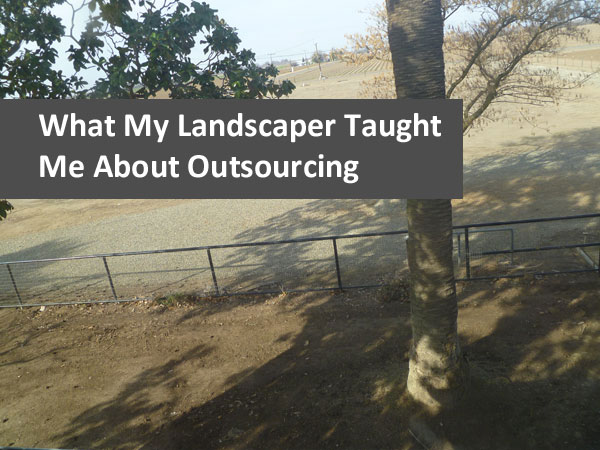Over the past several months, we have been living in a vast sea of dirt. Our fenced yard is about a half an acre and we are completely remodeling our landscape.
As part of our yard remodel we have worked with a number of contractors including a builder, designer, landscaper, gutter installer, “cement guy,” outdoor lighting professional and metal worker. Not all of these working relationships have been stellar, but they haven’t been all bad, either.
It has been some time since I have worked with so many contractors in such a short time-frame. But what this has facilitated is an ability to compare the service levels and my satisfaction with the work performed. What I realized is that I have learned a number of lessons in the process and they are applicable in any outsourcing situation, whether contractor or accountant.
When to Outsource
It is not always easy to give up control, which is what happens when you outsource. The benefit is that you are freed up to do other things which you might find more enjoyable, more profitable, a better use of your skills or possibly all of the above.
Although I was able to draw up a reasonable design for our new yard, bringing in a professional allowed that design to be refined as well as add critical information like plant lists. In this case, my skills were adequate to start, but not really sufficient to move the project forward. My husband and I are capable of building an additional set of stairs, but finding the time (and motivation) was a problem. Obviously if it was going to get done, we needed to hire someone to do it.
If you’re not sure how to know when to outsource, ask yourself these questions:
- Does someone else have a better combination of skills, knowledge, ability and tools to get the job done?
- Is the task something that “never seems to get done”, but remains an important element of broader goals and objectives?
- Could someone else be taught to do this activity with similar results?
- Is my time better invested in other tasks?
If you answered yes to more than one of these questions, then it is highly likely you have a task that should be outsourced.
Defining the Job
Some tasks are easy to define while others are significantly more complex. But taking the time to clearly define what you want to outsource will ultimately save you time in the end.
Start with clearly defining the objectives and outcomes. This will help ensure everyone is on the same page. If you are hiring for a service, think about the specific skills required to be able to outsource it effectively.
Decide what form of compensation makes sense (project based or hourly) depending on if this a one-time task or a regular, repeated activity. Consider whether you want to hire a seasoned professional (which is usually more expensive but requires less supervision and the contractor can get the job done more quickly), or hire an up-and-comer (who may take more time to train but will cost less).
The new gutters on our house look really good and function up to spec. Even so, our gutter contractor took much longer than he should have to get the job done. But because all of the above was in place, we weren’t out-of-pocket until the job was completed to satisfaction.
Who to Hire
Once you know you have a task to be outsourced, finding the right person for the job can be difficult. Even so, often the person you are looking for is only a few contacts away. Begin by asking friends, family and associates if they can recommend someone that meets your requirements. Even if they don’t know the “right” person, often they know someone who can lead you to that person.
Check references and when appropriate, look at examples of their work. Although my landscaper is the brother of an acquaintance, he has been hired repeatedly by another friend. Her yard was beautiful and had a similar look and feel that I wanted. The best reference is someone who hires the same person for repeat work.
Then always have an introductory meeting to do a “gut check.” Even when someone does good work, they are not necessarily the right fit. Our builder ultimately does good work, but I never really know where we stand on anything and I never feel like he hears what we are saying. Our landscaper probably over communicates which could also be a problem, but I would rather take a few extra calls than to be left in the dark.
The Simple Steps for Knowing When to Outsource
Ultimately, outsourcing work can be a great way to increase your own productivity:
- Decide which tasks and activities could benefit from outsourcing.
- Define a clear set of goals, expectations and outcomes.
- Use your network of friends, family and associates to find one or two candidates.
- Take time in your initial meeting to check communication styles and ensure the relationship feel right.
- Agree on the form and schedule of payment.
As always, the more that is put in writing, the less likely there will be points of disconnect. And then continue to communicate. Most misunderstandings could be avoided if issues are discussed early.


